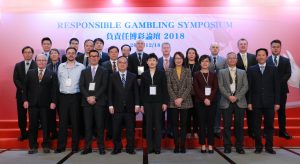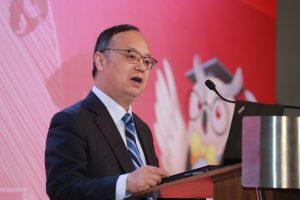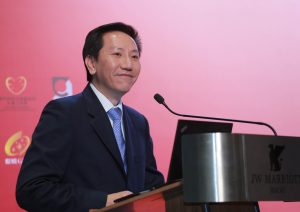This year marks the tenth anniversary of the promotion of ‘responsible gambling’. The University of Macau (UM) Institute for the Study of Commercial Gaming (ISCG) today (18 December) held the Responsible Gambling Symposium 2018. The event attracted experts and scholars from the United Kingdom, Canada, Japan, South Korea, Singapore, Beijing, Hong Kong, and Macao. During the event, the participants reviewed current policies and put forward new strategies for preventing gambling disorder in Macao and other parts of Asia.
In his speech, UM Rector Yonghua Song said that the first series of activities comprising the Responsible Gambling Awareness Week in Macao was co-organised in 2009 by the Social Welfare Bureau, the Gaming Inspection and Coordination Bureau, and the ISCG. After ten years of laborious effort, the prevention of gambling disorder in Macao has become a constant, professional, and popularised initiative. Song added that figures from a survey on the participation of Macao residents in gambling activities and another survey on the awareness of responsible gambling among Macao residents show that the prevalence of gambling disorders has gradually declined from its peak at 6 per cent in 2007 to 2.5 per cent in 2016. The proportion of Macao residents who are concerned with responsible gambling has also increased from 16.2 per cent in 2009 to 63.7 per cent in 2017. Song said that this achievement reflects the role and function of the SAR government as a leader in the implementation of responsible gambling polices, adding that the mutual commitment of all interested parties is also important.
ISCG Director Davis Fong said when the government decided to end the monopoly in the gaming industry in 2002, the general public thought that the city was immune to gambling addiction. As part of the academic circle, Fong felt obliged to figure out whether it was true and conducted a survey in 2003. According to Fong, it was found in the survey that approximately 1.78 per cent of the local population became pathological gamblers because of gambling activities. Based on this result, the SAR government launched various policies and measures to provide all-level preventive measures in the next decade, which has turned Macao into a city guarded by a modern administration.
The symposium was divided into two part. The keynote topics covered various important areas, including a summary of and an outlook for local responsible gambling policies, as well as an exploration of new trends in gambling activities and practical concepts in responsible gambling. In addition, a number of discussion sections were held for experts and scholars from Macao and neighbouring Asian countries and regions to exchange ideas on the planning, practice, and future development of responsible gambling.
Guests participating in the forum included Zhang Jianhua, deputy director of the Economic Affairs Department of the Liaison Office of the Central People’s Government in Macao SAR; Paulo Martins Chan, director of the Gaming Inspection and Coordination Bureau of Macao SAR; Maria Helena de Senna Fernandes, director of the Macao Government Tourism Office; Hoi Va Pou, deputy director of the Social Welfare Bureau of Macao SAR; and Jacky So, dean of UM’s Faculty of Business Administration.
Source: Faculty of Business Administration
Media Contact Information:Communications Office, University of Macau
Albee Lei Tel:(853) 88228004Kelvin U Tel:(853) 88224322Email:prs.media@um.edu.moUM Website:www.um.edu.mo




